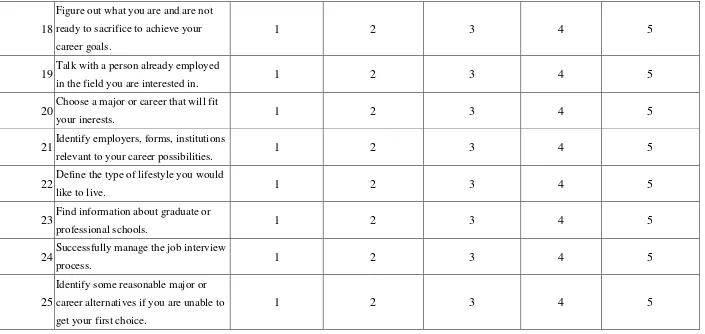Taylor,K.M.,& Betz, N.E. Applications of self-efficacy theory to the understanding and treatment of career indecision. Journal of Vocational Vehavior, 22, 63 - 81. Career Decision Self-Efficacy Scale-Short Form (CDSES-SF)
Question:
How much confidence do you have that you
could:
No confidence at
all
Very little
confidence
Moderate
confidence
Much
confidence
Complete
confidence
1
Find information in the labrary
about occupations you are
interested in.
1 2 3 4 5
2
Select one major from a list of
potential majors you are
considering.
1 2 3 4 5
3 Make a plan of your goals for the
next five years. 1 2 3 4 5
4
Determine the steps to take if you
are having academic trouble with
an aspect of your chosen major.
1 2 3 4 5
5 Accurately assess your abilities 1 2 3 4 5
6
Select one occupation from a list of
potential occupations you are
considering.
1 2 3 4 5
7
Determine the steps you need to
take to successfully complete your
chosen major.
Taylor,K.M.,& Betz, N.E. Applications of self-efficacy theory to the understanding and treatment of career indecision. Journal of Vocational Vehavior, 22, 63 - 81.
8
Persistently work at your major or
career goal even when you get
frustrated.
1 2 3 4 5
9 Determine what your ideal job
would be. 1 2 3 4 5
10
Find out the employment trends for
an occupation over the next ten
years.
1 2 3 4 5
11 Choose a career that will fit your
preferred lifestyle. 1 2 3 4 5
12 Prepare a good resume. 1 2 3 4 5
13 Change majors if you did not like your
first choice. 1 2 3 4 5
14 Decide what you value most in an
occupation. 1 2 3 4 5
15 Find out about the average yearly
earnings of people in an occupation. 1 2 3 4 5
16
Make a career decision and then not
worry about whether it was right or
wrong.
1 2 3 4 5
17 Change occupations if you are not
Taylor,K.M.,& Betz, N.E. Applications of self-efficacy theory to the understanding and treatment of career indecision. Journal of Vocational Vehavior, 22, 63 - 81.
18
Figure out what you are and are not
ready to sacrifice to achieve your
career goals.
1 2 3 4 5
19 Talk with a person already employed
in the field you are interested in. 1 2 3 4 5
20 Choose a major or career that will fit
your inerests. 1 2 3 4 5
21 Identify employers, forms, institutions
relevant to your career possibilities. 1 2 3 4 5
22 Define the type of lifestyle you would
like to live. 1 2 3 4 5
23 Find information about graduate or
professional schools. 1 2 3 4 5
24 Successfully manage the job interview
process. 1 2 3 4 5
25
Identify some reasonable major or
career alternatives if you are unable to
get your first choice.
